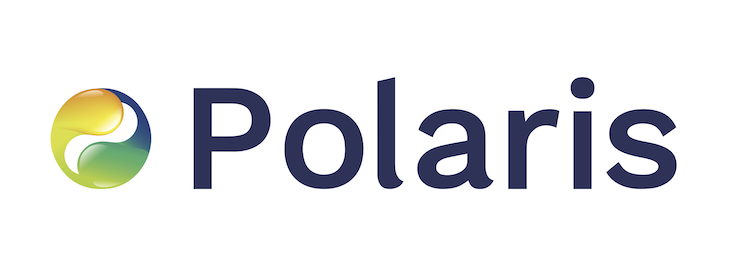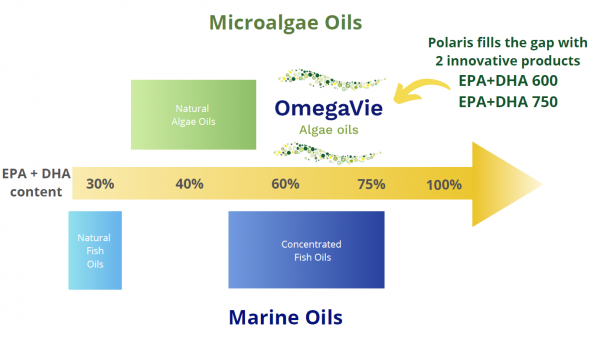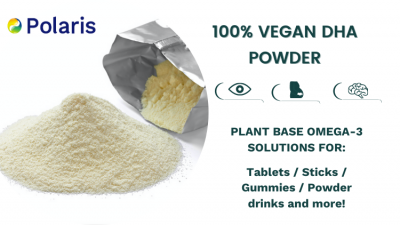Promotional Features
POLARIS' INNOVATION: PLANT-BASED EPA AND DHA AVAILABLE TO THE MARKET, OPENS NEW HORIZONS
With the continued growth of the “plant-based revolution”, consumers are continually looking for healthier and more sustainable alternatives which include products in the supplement market. Fish oils have long dominated the omega-3 market given their richness in PUFAS such as EPA and DHA. Sustainable alternatives rich in both EPA and DHA have been limited, until now.
“To meet the global shift towards plant-based nutrition, Polaris is rising to the challenge to meet the consumer demand for superior alternatives to concentrated fish oils,” says Louis-Marie Martin, VP Sales and Marketing at Polaris.
Thanks to its proprietary technology, Polaris can now deliver a vegan source of highly concentrated EPA and DHA to the market.
Lipids are the main constituents of the brain (50% to 60% of the dry weight). They are essential to its functioning and DHA helps the brain to function properly. A good intake of omega-3 (DHA) during pregnancy and breastfeeding will also support the brain1 and eyes2 development of the foetus as well as the infant. Moreover, eating fish during pregnancy is not always recommended due to its potential contamination with heavy metals.
EPA and DHA allow the heart to function properly. Scientific data also observe in patients taking an omega-3 supplement a regulation of blood pressure3 and the quantity of triglycerides4 in the blood. Other clinical studies have demonstrated the effect of omega-3s on the inflammatory system especially in the reduction of inflammatory joint symptoms.
HIGHER CONCENTRATION FOR HIGHER DOSAGE AND COMPLEX FORMULATION
Two key drivers in the omega-3 industry are increasing the concentration in EPA/DHA, as well as improving the sensory properties (smell and taste). Until today, a vegan alternative with a concentration of more than 600 mg/g in EPA and DHA was not available.
Many studies over the past decade recommend much higher intake levels of essential EPA/DHA than the relatively low government regulations in the EU and US. To achieve these levels, without asking the consumer to increase their daily consumption of dietary pills, omega-3 content must be increased. Further challenges from lower PUFA concentrations arise in formulations making it difficult for companies to develop highly nutritional supplements due to the oil loading limitations in their matrix (powders, tablets etc).
Polaris’ innovation now brings to the market a plant-based alternative to address this situation, allowing for new clinically relevant products to enhance consumer well-being.
NEW OMEGA-3S SOLUTIONS FOR THE FINAL CONSUMER ENJOYMENT
Supported by more than 40,000 scientific publications and over 4,000 clinical trials, omega-3’s are essential for good health and nutrition. Without the relevant intake of EPA/DHA, evidence demonstrates the many health alignments that can occur. Polaris is able to meet the consumer demand for clinically relevant, sustainable, plant-based PUFA’s in three important areas:
High content: applies to all dietary supplements, sports and health nutrition and food applications. “Higher EPA and DHA content widens the scope of possibilities, allowing new innovative formulas without compromising on the intended target in Omega-3, nor the possibility to use other active ingredients.” adds Louis-Marie Martin.
Sensory/quality: Polaris is a market leader in quality, making significant investments over the years in both manufacturing as well as consumer studies. “We have also conducted a consumer study in 2020 on the relations among oxidation, sensory and fish burps, in order to further improve the smell / taste of our products and to minimize potential discomfort linked to the fishiness of omega-3 product.” says Gildas Breton, R&D director.
Sustainability: With our fermentation technology, microalgae oils are not exposed to environmental containments such as arsenic / micro plasticizers, etc. As stated in 2017 in Ellen MacArthur Foundation study “The new plastic economy”5, if the current trend continues, there could be more plastic than fish (by weight) in the ocean by 2050. Being grown in a controlled environment, microalgae oils have no impact on marine resources and will not suffer from any presence of marine pollutants.
TWO NEW PRODUCTS DESIGNED FOR SPECIFIC HEALTH BENEFITS
Polaris is launching two new microalgae products, providing consumers with a vegan and vegetarian friendly source of highly purified EPA and DHA:
- EPA DHA 750 QUALITYSILVER 5: New product designed for brain health, eye health and maternity / prenatal application, with a content of 750 mg/g of EPA + DHA.
- EPA DHA 600 QUALITYSILVER 5: A second product designed for cardiovascular, joint health and immunity, containing 600 mg of EPA + DHA, with a higher amount of EPA.
For more information, please visit our website at www.polaris.fr or contact a member of our sales team and product development team.
References:1. J.Thomas Brenna, Susan E. Carlson,2014. Docosahexaenoic acid and human brain development: Evidence that
a dietary supply is needed for optimal development. Journal of Human Evolution 77 (2014) 99e106
2. Lotte Lauritzen ,Paolo Brambilla, Alessandra Mazzocchi, Laurine B. S. Harsløf,
Valentina Ciappolino and Carlo Agostoni, DHA Effects in Brain Development and Function. Nutrients 2016, 8, 6;
3. Cicero AF, Ertek S, Borghi C, Omega 3 polyunsaturated fatty acids: their potential role in blood pressure prevention and management, Curries Vasc Pharmacol. 7(3): 330-7 (Jul 2009)
4. Angela Pirillo, Alberico L. Catapano Omega-3 polyunsaturated fatty acids in the treatment of atherogenic dyslipidemia. Atherosclerosis Supplements 14 (2013) 237–242
5. Ellen Macarthur foundation – THE NEW PLASTICS ECONOMY RETHINKING THE FUTURE OF PLASTICS - 2016



